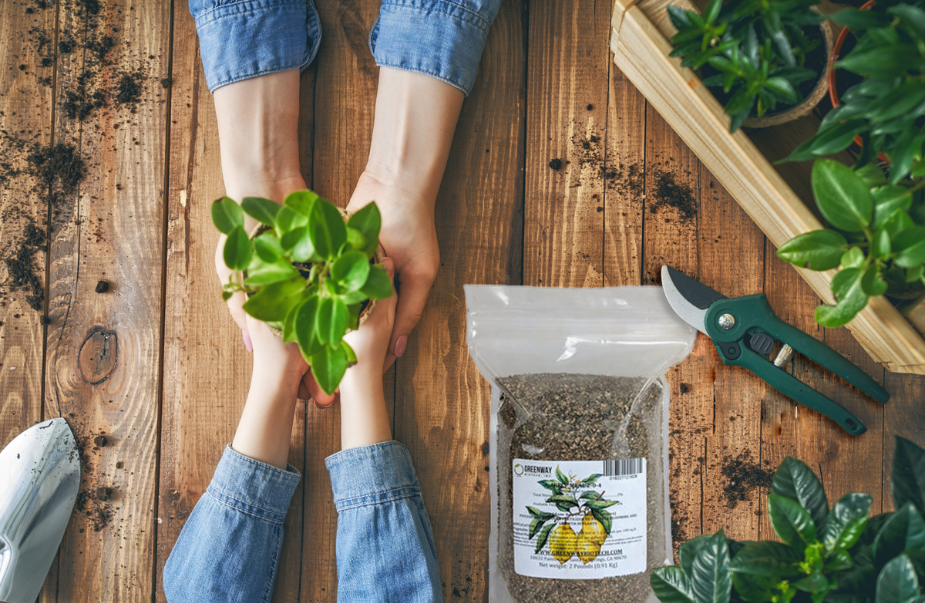How Plant Food is Not the Same As Plant Fertilizer
•Posted on May 13 2022

The health and growth of plants depend on several factors, such as the available nutrients, which provide plants with food and protect them from diseases.
Plant food and plant fertilizers are two commonly mistaken words. Here is what to know about them.
Definitions of Plant Food and Plant Fertilizer

Both plant food and plant fertilizer promote plants' healthy and faster growth. Plant food consists of the natural nutrients already in the soil (water, air, and light).
Plant fertilizer only contains nitrogen (N), phosphorous (P), and potassium (K), which are essential macronutrients for plants.
Related Post: Major Elements vs. Trace Elements
So, plant food is what plants make from water, air, sunlight, and other soil nutrients like NPK. Note that plant food is not added to the soil.
Plant fertilizer is a natural or chemical nutrient (NPK) that one has to top up to the soil to boost plants' growth. You will add the plant fertilizers around the plants during their early growth stages.
Key Differences Between Plant Food and Plant Fertilizer

The first difference between plant food and its fertilizer is in the occurrence of the two. Unlike plant fertilizer, plant food occurs naturally. Indoor/household plants are perfect examples that reflect the natural occurrence in plant food.
Related Post: How to Grow a Successful Indoor Garden
Such plants depend on water and sunlight to make their own food through photosynthesis. The success of indoor plants' photosynthesis doesn't require fertilizers. Failure of the household plants to make their own foods doesn't reflect a deficiency in chemical nutrients.
On the contrary, the fertilizing process does not take place naturally. You must add the fertilizer around the plant's roots for the plants to absorb the nutrients.
Unlike plant food, plant fertilizer is available as a commercial product. Plant fertilizer comes in the form of solid, powdered and liquid fertilizer. Plants make their own food (plant food), making it commercially unavailable.
Again, indoor plants' photosynthesis is a faster process. As a result, they make plant food many times compared to when you apply plant fertilizer. So, household plants become more productive when not fertilized.
Related Post: 5 Common Mistakes to Avoid When Growing Herbs Indoors
Role of Micronutrients and Macronutrients

Various micro and macronutrients play significant roles in the growth of crops. Examples of macronutrients are:
- Calcium (Ca)
- Nitrogen
- Potassium
- Phosphorus
- Hydrogen (H)
- Oxygen (O)
- Sulphur (S)
- Magnesium (Mg)
Examples of micronutrients are:
- Iron (Fe)
- Zinc (Zn)
- Nickel (Ni)
- Copper (Cu)
- Cobalt (Co)
- Chlorine (CI)
- Manganese (Mn)
- Sodium (Na)
Related Post: Major Elements vs. Trace Elements: Why Your Plants Need Both
Nitrogen, Phosphorus and Potassium (NPK) are the major macronutrients required for the healthy growth of plants.
Nitrogen (N) has several functions, and one of them is enhancing plant metabolism. Several physiological processes promote nitrogen plant metabolism.
Among them are the transportation of nitrate or ammonium via the root's cell membranes and the fixation of nitrogen in the legume nodules.
Other roles of nitrogen include:
- Promoting plant germination
- Photosynthesis
- Formation of chlorophyll
- Speeding the foliage growth
What is the Role of Phosphorus in Plants?
Phosphorous (P) strengthens the plants' roots, makes them resistant to diseases, and enhances their formation of flowers, fruits and the production of seeds.
Related Post: What's the Function of Phosphorus in Plants?
What is the Role of Potassium in Plants?
Potassium (K) makes the plants resistant to fungi and diseases.
The macronutrient also improves the plants' water absorption, drought tolerance, cold hardiness and sugar synthesis. Bone meal is a good source of NPK.
Related Post: What's the Function of Potassium (K) in Plants?
What is the Role of Micronutrients in Crops?
Micronutrients also play significant roles in crops.
Zinc helps plants in their early growth stages. The micronutrient aids the formation of plant roots, photosynthesis, auxin activity and plant hormonal balance.
Iron helps in photosynthesis, lignin formation, the production of chlorophyll and nitrogen fixation. Boron helps plants transport sugars, develop flowers and produce amino acids.
Grow With Us!

The soil type you have will determine if your plants get adequate micronutrients. Clay soils are rich in micronutrients and soil minerals. Macronutrients are available in plant fertilizer.
Fortunately for your plants, we carry a wide range of fertilizer products like organic fertilizers, water-soluble fertilizers and hydroponics nutrients for your indoor and outdoor plants' healthy growth.
Browse our full fertilizer collection here and be on your way to healthier plant growth.
Comments
0 Comments
Leave a Comment